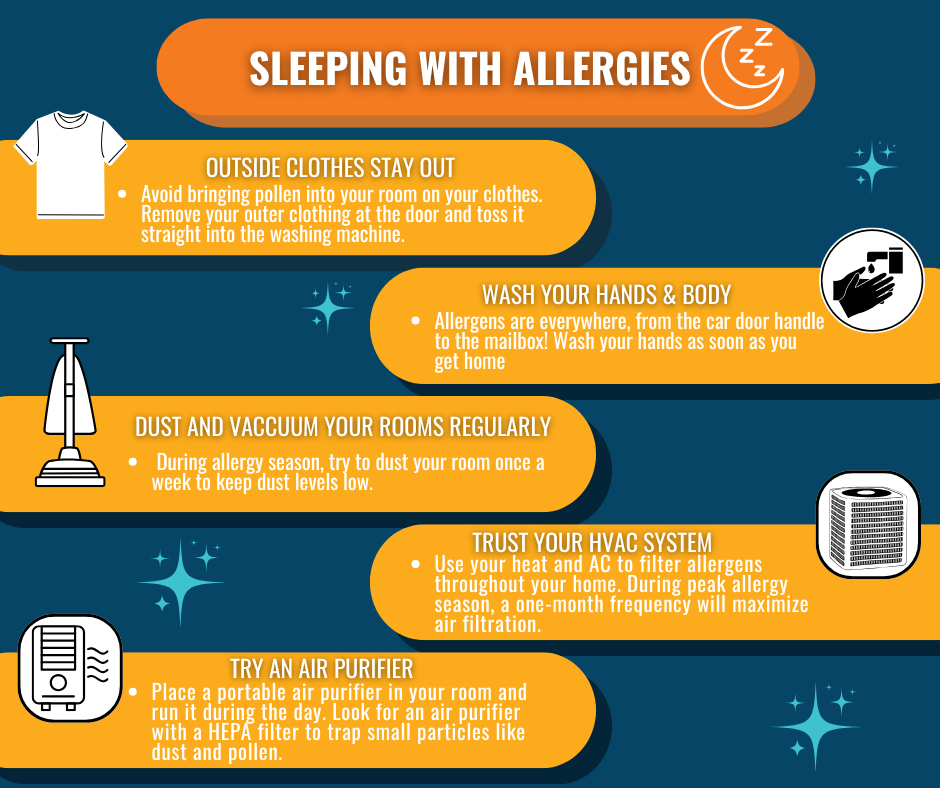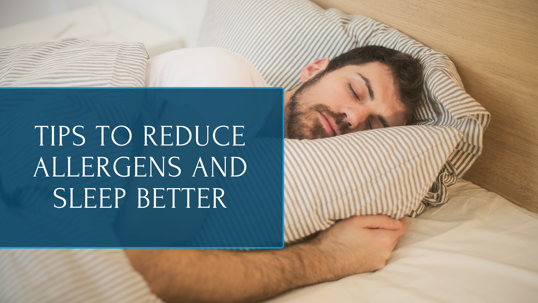Seasonal allergies can significantly impact your sleep quality. Many allergy sufferers in Kansas City endure long nights of wheezing, tossing, and turning from early spring through September, when pollen counts peak.
This year, take control of your symptoms with practical changes to your regimen and reduce allergen and pollen levels in your home, particularly your bedroom. Learn how allergy-friendly practices and HVAC maintenance can help you breathe and sleep easier this season.
Allergies and Sleep: What’s the Connection?
Exposure to seasonal or environmental allergies makes sleeping difficult because they cause coughing, sneezing, wheezing, post-nasal drip, and sinus pressure. It’s likely no surprise that allergies significantly reduce the quality of sleep. Considerable research links difficulty sleeping during allergy season to daytime fatigue and an increased risk ofdeveloping sleep disorders.
Roughly40% of Americans have seasonal allergies. While there’s no cure, you can prevent or reduce the severity of symptoms by decreasing your exposure to allergens like dust and pollen.

![]()
Keep Allergens Out of Your Bedroom
- Keep pollen out. During allergy season, keep windows and doors closed, especially from late morning to early evening when pollen levels peak.
- Shower up. When you get home, remove your outer layers of clothing at the door and shower to wash pollen off your skin and hair.
- Prevent dust mites in the bedroom. Dust and vacuum your bedroom weekly to stay ahead of dust, pollen, and other contaminants. You may need to dust your bedroom every other day if you have severe allergies. You’ll sleep much better.
- Keep pets out of your bedroom. Provide your pet with a cozy place to sleep in a separate room or at least on the bedroom floor. Dog beds can harbor allergens, especially if your dog spends significant time outside. Wash your pet’s bed as often as you wash your sheets—think weekly!
- Maintain your HVAC system. A well-maintained HVAC system is the most effective tool for filtering indoor air throughout your home. Along with scheduling annual maintenance, replace your air filter every one to three months to mitigate allergens and dust. If you have pets or underlying respiratory issues, replacing the filter every month can be beneficial, especially during allergy season.
- Use an air purifier. Air purifiers filter indoor air, improving air circulation and lowering the concentration of allergens in your bedroom. Look for an air purifier with a HEPA filter, which is rated to trap the smallest airborne particulates.
Read More: Three Ways to Address Poor Indoor Air Quality
Why Do My Allergies Get Worse at Night?
Due to various factors, allergy symptoms can worsen in the evening, especially when you're about to go to bed. For example, histamine, the chemical that triggers allergy symptoms in the body, peaks in the evening. Similarly, pollen levels also tend to peak at dusk. Body position, temperature, and humidity shifts can all work against a good night’s sleep during allergy season.
Can Sleeping with a Humidifier Help Allergies?
Yes, sleeping with a humidifier can help thin mucus and hydrate nasal passages, making breathing much more comfortable during allergy season. Remember, too much humidity can lead to mold and mildew growth, which could worsen your allergy symptoms. Aim to keep your home’s humidity between 30% and 50% for optimal indoor air quality.
Take On Allergy Season with Help from C.M. Mose & Son
Protect your home against allergens and irritants with prompt, affordable, and energy-efficient solutions from our team. Our technicians work hard to maintain, repair, or replace your home’s HVAC system, improving the quality of the air you breathe inside your home.
Call 816-339-5190 or contact us online to schedule HVAC, electrical, or plumbing services in Pleasant Valley and the surrounding areas.

